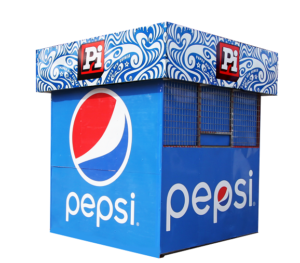After an on-again, off-again presence in Papua New Guinea, Pacific Industries recently relaunched Pepsi drinks brand – and they are empowering people to set up small businesses to sell it.
Since it first launched in PNG in the 1970s, the Pepsi franchise has bounced around different companies, starting with SP Brewery, then Paradise Foods and, just last year, the former Coca-Cola franchisee Pacific Industries, which re-launched the international cola – and its associate products Mountain Dew and Mirinda – in December.
Pacific Industries Director, Everett Chue, says that they were pleased to get the Pepsi franchise because it fills a gap left when they lost the Coca-Cola rights (Coke brought all rights under its listed entity Coca-Cola Amatil in 2009). The Pepsi brand now sits alongside Pacific Industries’ local offerings such as GoGo Cola and Gold Spot Cola, which was launched by Chue’s grandfather during World War 2.
‘Because Pepsi has been around since the 1970s, there is a generation out there that will want, and like, Pepsi. But they have not had the chance to have it for the past 20 years; we are just providing a product that the market wants.’
Passing the taste test
Getting Pepsi flowing back into PNG did not come without its challenges.
‘We were negotiating the contract for almost a year and, in order to become Pepsi-approved, all your facilities have to be audited,’ Chue says. ‘That was an eight-month process of Pepsi reviewing our factory, making recommendations and then us having to upgrade it and make changes to adhere to the international standards. Because our factory is in Rabaul, in a remote area, it is very hard to get specialists up there.’
‘We really like to see someone go from selling a carton of drinks on the street to turning over K1000-plus a week in a little stall.’
Pepsi also wanted to vet suppliers of raw materials: the sugar, the water and the cans used to produce its iconic cola. Then, once the first batches of Pepsi were made, they were shipped to an international laboratory for testing. Chue and his team passed the taste test.
Empowering people in PNG
Pacific Industries is not just manufacturing soft drinks, however. Under a new ‘kiosk program,’ it is also helping a generation of Papua New Guineans launch their own small businesses. The company builds a three-metre by three-metre kiosk: a secure, lockable “mini-canteen”, with power, lights, fridges and freezers so that people can start their own roadside business.
‘First, we identify an entrepreneur; someone who is interested in starting their own business. Then we help them find a location that will have high traffic and be viable, then we lease this kiosk to them for free, essentially, as long as they adhere to certain terms like not selling directly competing products.’
They can sell additional items at their kiosk, but not products that are in direct competition with Pacific Industries’ products.
So far, the program has produced 60-plus kiosks in the Port Moresby area and Chue’s team of 12 is producing around two kiosks a day.
‘We deliver the kiosk to the entrepreneur and we provide an avenue for them to start a small business and it is working really well. We really like to see someone go from selling a carton of drinks on the street to turning over K1000-plus a week in a little stall. We stock it, provide signage and assist them the whole way.’
Chue sees the program as an important way to grow the SME sector.
‘The kiosk program will create employment, generate passive income for landowners and encourage people to become self sufficient. We have seen enormous interest into this kiosk program and see it growing to be a staple part of the SME sector.’









Speak Your Mind